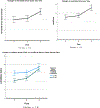Correlates of psychological distress among adults with obesity during the COVID-19 pandemic
- PMID: 35156476
- PMCID: PMC9946156
- DOI: 10.1080/08870446.2022.2038790
Correlates of psychological distress among adults with obesity during the COVID-19 pandemic
Abstract
Objective: The present study evaluated changes in stress and loneliness among participants with obesity engaged in weight loss self-management in the United States (US) during COVID-19, and identified factors that may increase risk or protect against psychosocial distress during this time.
Design: Participants who were enrolled in a weight self-management program prior to the COVID-19 pandemic (N = 55, 91% female, 36% Caucasian, mean age = 49.8 years) completed an online survey about social, economic and health behaviour changes during COVID-19 and their relationship to changes in perceived stress and loneliness.
Main outcome measures: Perceived Stress (PSS-4), Loneliness (PROMIS loneliness and social isolation questionnaire).
Results: Compared to pre-COVID assessments, stress and loneliness increased 40% two months into the COVID-19 pandemic-related shutdown. Higher body mass index (BMI) and social distancing were associated with increases in both loneliness and stress. Alcohol intake was associated with increased stress, and working from home was associated with increased loneliness.
Conclusion: Individuals with obesity endorsed increased stress and loneliness during COVID-19, which may be exacerbated among those with a higher BMI and greater adherence to social distancing guidelines. Ongoing attention to psychosocial well-being among individuals with obesity will remain imperative both during the ongoing pandemic and beyond.
Keywords: COVID-19; loneliness; obesity; social isolation; stress.
Conflict of interest statement
Figures


References
-
- Apolloni A, Marathe A, & Pan Z. (2011). A Longitudinal View of the Relationship Between Social Marginalization and Obesity. In Salerno J, Yang SJ, Nau D, & Chai S-K (Eds.), Social Computing, Behavioral-Cultural Modeling and Prediction (Vol. 6589, pp. 61–68). Springer Berlin; Heidelberg. 10.1007/978-3-642-19656-0_10 - DOI
-
- Cacioppo JT, Hawkley LC, Crawford LE, Ernst JM, Burleson MH, Kowalewski RB, Malarkey WB, Van Cauter E, & Berntson GG (2002). Loneliness and Health: Potential Mechanisms. Psychosomatic Medicine, 64(3), 407–417. - PubMed
-
- Calder PC, Ahluwalia N, Brouns F, Buetler T, Clement K, Cunningham K, Esposito K, Jönsson LS, Kolb H, Lansink M, Marcos A, Margioris A, Matusheski N, Nordmann H, O’Brien J, Pugliese G, Rizkalla S, Schalkwijk C, Tuomilehto J, … Winklhofer-Roob BM (2011). Dietary factors and low-grade inflammation in relation to overweight and obesity. British Journal of Nutrition, 106(S3), S1–S78. 10.1017/S0007114511005460 - DOI - PubMed
Publication types
MeSH terms
Grants and funding
LinkOut - more resources
Full Text Sources
Medical
